- Home
- Events
- Conferences and Workshops
- Franco-German Observatory of the Indo-Pacific
Lecture Series
Franco-German Observatory of the Indo-Pacific
Date
27/02/2025
Start
04:00 p.m. (CET)
End
05:00 p.m. (CET)
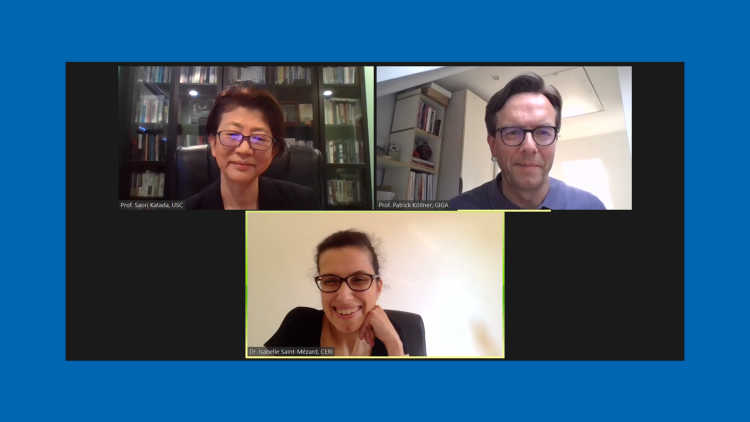
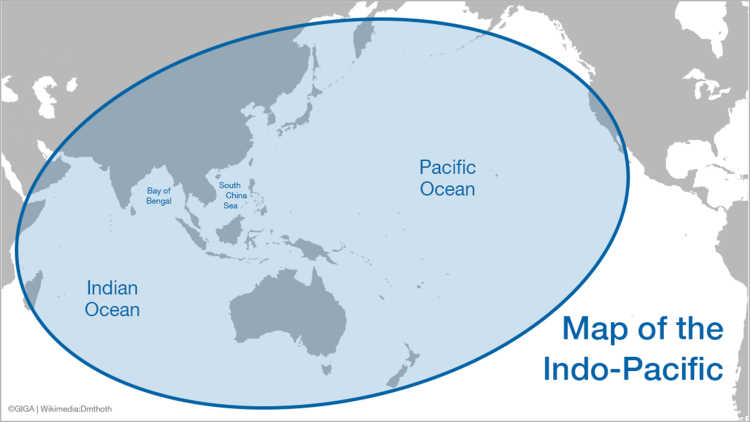
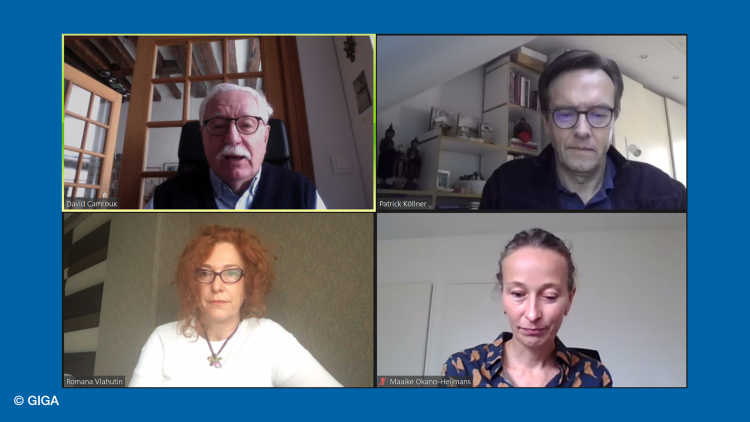
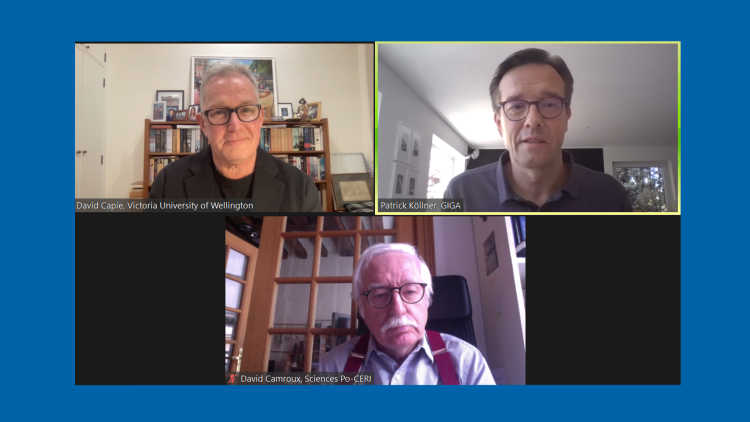
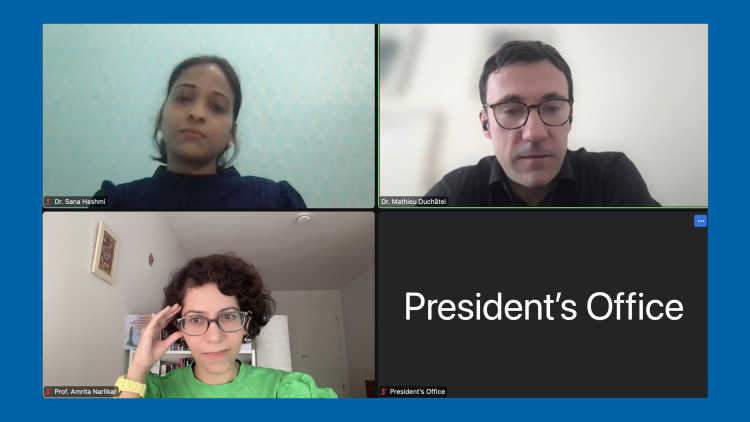
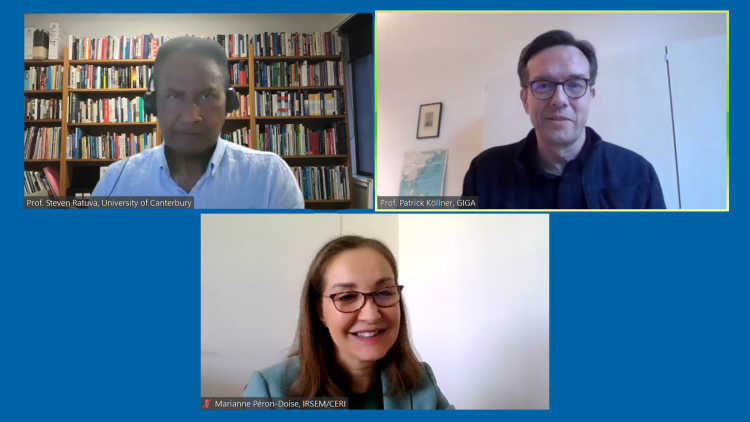
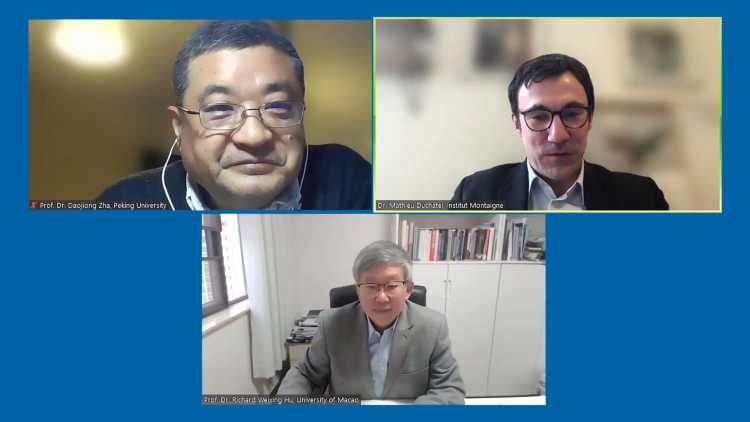
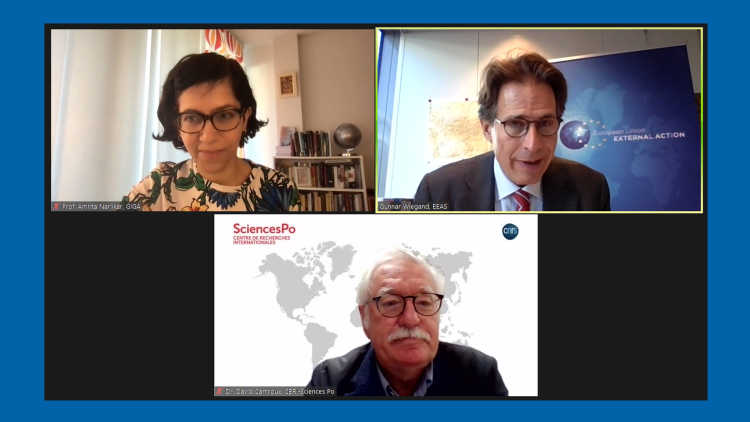
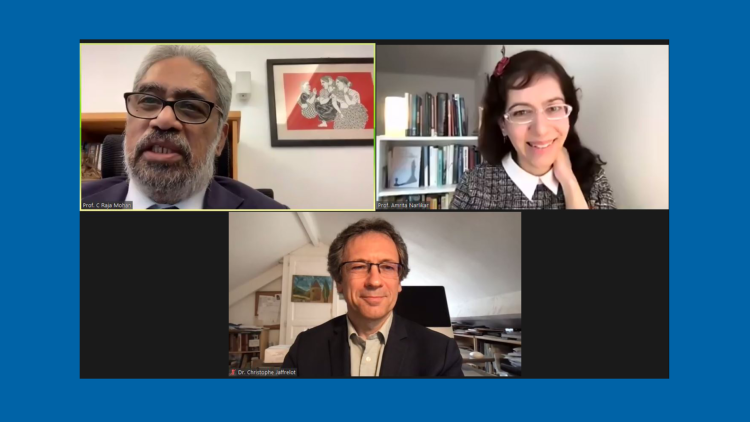










Previous Events
An Indo-Pacific Military-Industrial Complex? The integration of defence industries and US hegemony?
The 29th webinar of the Franco-German Observatory of the Indo-Pacific, hosted by the CERI, features Dr Kelly A. Grieco of the Stimson Center in Washington. She will speak about the integration of defence industries and US hegemony. Is an Indo-Pacific military-industrial complex in the making?
Thursday, 27 February 2025 | 4:00 p.m. CET | 10:00 a.m. EST
Speaker: Dr. Kelly A. Grieco is a Senior Fellow with the Reimagining US Grand Strategy Program at the Stimson Center, where her work focuses on US foreign policy and defense policy, addressing questions about international security, military force structure military alliances, drone warfare, air operations, and the future of war.
Moderators: Dr. Jérôme Doyon is a Junior Professor at the Centre for International Relations (CERI) at Sciences Po Paris. Prof. Dr. Patrick Köllner is Vice President of the German Institute for Global and Area Studies (GIGA), Director of the GIGA Institute for Asian Studies, and a Professor of Political Science at Universität Hamburg.
U.S. Freedom-of-Navigation Operations as Signals in the South China Sea
Wednesday, 29 January 2025 | 14:00–15:00 p.m. (CET) | Online
U.S. FONOPs in the South China Sea officially serve a limited legal purpose, but they have caused much confusion and consternation. Why? Analyzing U.S. FONOPs as a form of signaling, we explain why they are ambiguous foreign policy signals and which signaling interpretations are the most plausible.
Speakers: Brian C. Chao, PhD, is an Assistant Professor in the National Security Affairs Department of the Naval War College, as well as a Non-Resident Associate of the Center for the Study of Contemporary China at the University of Pennsylvania.
Hyun-Binn Cho, PhD, is an Assistant Professor in the Department of Political Science at The College of New Jersey.
Moderators: Dr. Johannes Plagemann is Senior Research Fellow at the GIGA. Dr. Raphaëlle Khan is Assistant Professor of Political Science at the The City University of New York (City College).
Ending UK Sovereignty Over the Chagos Islands: Legal, Political and Strategic Implications
Monday, 4 November 2024 | 9:30–10:30 a.m. (CET) | Online
Speaker: Dr. Kate O'Shaughnessy is Research Director of the Perth USAsia Centre at the University of Western Australia. As a former Australian diplomat, Dr. O'Shaughnessy held Ambassadorial posts in Mauritius and the Seychelles as well as Madagascar and Comoros. Her doctoral thesis in Indonesian history, Gender, State and Social Power in Contemporary Indonesia, was published by Routledge in 2009. Moderators: Dr. Johannes Plagemann is a Senior Research Fellow at the GIGA. Dr. David Camroux is an Honorary Research Fellow and Adjunct Professor, Sciences Po-CERI.

Regional Orders and Great Power Rivalry in a Multiplex World
Monday, 1 July 2024 | 12:00 noon – 1:00 p.m. (CEST) | Online
The passing of American hegemony is heralding a multiplex world or a multi-regional order world. The emerging world order will neither be unipolar nor bipolar. Although multipolarity is rising, the emerging order will be more than simply multipolar. Drawing on the concept of multiplexity, we argue that regions will play an increasingly important role, not merely as theatres of Great Power rivalry, but as relatively autonomous entities in shaping its intensity and scope. In addition to emerging as important sites for order-building, regions are also reorganizing. The Indo-Pacific – or the primary theatre of the U.S.-China rivalry – is seeing the emergence of such a multiplex international order. This regional order is being led and legitimized by the weaker regional powers that are ideologically plural. The Indo-Pacific regional order will be “open” and connected with its neighbouring regions in the Middle East, Europe, and beyond.
Speaker: Associate Professor Manjeet Pardesi is Head of the Political Science & International Relations Programme, Victoria University of Wellington. He is also Asia Research Fellow, Centre for Strategic Studies, Wellington, and Managing Editor of Asian Security. Currently, he is a visiting scholar at the GIGA.
Moderation: Dr. Miriam Prys-Hansen is a Lead Research Fellow and Head of the Research Programme "Global Orders and Foreign Policies" at the GIGA. Dr. David Camroux is Honorary Research Fellow and Adjunct Professor, Sciences Po-CERI.
How China's Presence in South Asia Shapes India's Indo-Pacific Policy
Monday, 10 June 2024 | 1:00–2:00 p.m. (CEST) | Online
Speaker: Dr. Smruti S Pattanaik is a Research Fellow at the Manohar Parrikar Institute for Defence Studies and Analysis (MP-IDSA). She holds PhD in South Asian Studies from the School of International Studies, JNU and specializes on politics in South Asia and India’s policy towards its Neighbours and China in South Asia. She was a visiting Asia Fellow at the department of International Relations, Dhaka University in 2004 and 2007, Kodikara Fellow in 1999, postdoctoral fellow at FMSH, Paris in 2008 and visiting fellow at PRIO in 2011, Fellow at the University of Hull in 2018. She was Visiting Professor on ICCR’s India Chair in Colombo University in 2013. She was selected to attend the prestigious Symposium on the East Asian Security (SEAS) Program conducted by the US State Department and USPACOM in 2011. She has lectured extensively in India and abroad on India’s foreign policy and South Asia. Dr. Pattanaik has published more than 100 research articles and chapters on various aspects of politics in South Asia and have focused on India’s relations with its neighbours. She is the author of “Elite Perception in Foreign Policy: Role of Print Media in influencing Indo-Pak relations, 1989-99” (2004) and has edited three books titled “South Asia: Envisioning a Regional Future” (2011) and “Four Decades of India-Bangladesh Relations: Historical Context and Future Direction (2012), “Recounting the Memories of Bangladesh’s Liberation War: Why It Is Still Relevant” (Routledge, 2024) She has also authored a monograph “Afghanistan and its Neighbourhood: In Search of a Stable Future (PRIO-IDSA, 2014).
Moderation: Dr. Raphaëlle Khan is Assistant Professor of Political Science at the The City University of New York (City College). Dr. Johannes Plagemann is Senior Research Fellow at the GIGA.

Formula X: the Electric Vehicle Race in the Indo-Pacific
Wednesday, 29 May 2024 | 9:00–10:00 a.m. (CEST) | Online
This event of the Franco-German Observatory of the Indo-Pacific features Professor Yves Tiberghien, University of British Columbia, Canada. He will speak about the dynamics of the unfolding competition in the market for electric cars and other vehicles.
Speaker: Prof. Dr. Yves Tiberghien (Ph.D. Stanford University, 2002; Harvard Academy Scholar 2006; Fulbright Scholar 1996) is Professor of Political Science and Konwakai Chair in Japanese Research at the University of British Columbia (UBC) in Vancouver, Canada. He is Director Emeritus of the Institute of Asian Research, and Director of the Center for Japanese Research. Yves Tiberghien is also a Distinguished Fellow at the Asia-Pacific Foundation of Canada and a Visiting Professor at Sciences Po. His latest book is The East Asian Covid-19 Paradox (Cambridge University Press, 2021).
Moderation: Prof. Dr. Elsa Lafaye de Micheaux is Professor of Asian Political Economy at INALCO. Dr. Miriam Prys-Hansen is a Lead Research Fellow and Head of the Research Programme "Global Orders and Foreign Policies" at the GIGA.

Thailand's Autocracy Complex and Its Indo-Pacific Consequences
Tuesday, 12 March 2024 | 11:30 a.m.–12:30 p.m. CET | 5:30–6:30 p.m. Thailand time | Online
Speaker: Prof. Dr. Thitinan Pongsudhirak is Professor of International Relations at Chulalongkorn University, Bangkok, and Senior Fellow at its Institute of Security and International Studies.
Chairs & Moderation: Prof. Dr. Eugénie Mérieau is Associate Professor at the University of Paris, Panthéon-Sorbonne. PD Dr. Andreas Ufen is Senior Research Fellow at the GIGA Institute for Asian Studies.
The Origins and Future Prospects of Lithuania‘s Indo-Pacific Strategy
Wednesday, 13 December 2023 | 9:00‒10:00 a.m. (CET)
Speaker: Associate Prof. Dr. Linas Didvalis has acquired his PhD of political science from International Christian University in Tokyo, Japan. At the moment he is heading development of East Asian studies at Vytautas Magnus University (Kaunas, Lithuania) and teaching courses on contemporary East Asian domestic and international politics. In the recent years, Dr. Didvalis conducted research visits at China Foreign Affairs University (Beijing, China) and Meijo University (Nagoya, Japan).
Chairs & Moderation: Dr. David Camroux is Honorary Research Fellow and Adjunct Professor, Sciences Po-CERI. Prof. Dr. Patrick Köllner is Vice President of the German Institute for Global and Area Studies (GIGA), Director of the GIGA Institute for Asian Studies, and a Professor of Political Science at Universität Hamburg.

Soft Balancing? The Czech Republic's Strategy for Cooperation in the Indo-Pacific
Wednesday, 22 November 2023 | 9:00‒10:00 a.m. (CET)
Speaker: Dr. Alica Kizeková is a Senior Researcher and Head of the Asia-Pacific Unit at the Institute of International Relations (IIR) in Prague. Previously, she was an adviser to the Speaker of the Chamber of Deputies of the Parliament of the Czech Republic (2015‒2017), Director of the Department of Asian Studies at the Metropolitan University of Prague (2014‒2015), and a Visiting Fellow at Nanyang Technical University in Singapore. Her professional interests include regionalism, multilateralism, geopolitics, democratization, soft balancing, great power relations and security in Central Europe, Central Asia and the Indo-Pacific region. Her study, Soft Balancing in the Indo-Asia-Pacific, is to be published by Routledge in 2024.
Chairs & Moderation: Dr. David Camroux is Honorary Research Fellow and Adjunct Professor, Sciences Po-CERI. Dr. Andreas Ufen is a Senior Research Fellow at the GIGA.

East Africa: The Indo-Pacific’s Western Perimeter
Tuesday, 20 June 2023 | 10:00‒11:00 a.m. (CEST)
Speakers: David Willima works as a Research Officer on maritime security at the Institute for Security Studies in the Pretoria office. Before joining the ISS, he worked for the Environmental Learning and Research Centre at Rhodes University in South Africa as a research assistant on the International One Ocean Hub research programme for transformative ocean governance. Mr Willima has a background in Political and International Studies from Rhodes University. He is currently studying towards a MA in Security Studies in the Department of Political Science at the University of Pretoria, focusing on Ocean governance in the Western Indian Ocean region. Tshegofatso Johanna Ramachela has an Honours Degree in International Relations from the University of Pretoria, where she is currently completing her Masters's Degree in International Relations, specialising in Security Studies. Ms Ramachela is a Research Consultant for the Maritime Project at the Institute for Security Studies in South Africa, where her research focus is primarily on transnational organised crime and the use of unmanned systems, including drones, in Africa’s maritime space. She is also a Research Consult in the University of Pretoria’s Department of Political Science, on a project titled “Seeing the Sea: Promoting BRICS maritime cooperation for African security and sustainable development”, where her focus is on BRICS vis-a-vis maritime security.
Chairs & Moderation: Dr. David Camroux is Honorary Research Fellow and Adjunct Professor, Sciences Po-CERI. Prof. Dr. Christian von Soest is Lead Research Fellow and Head of Research Programme "Peace and Security" at the GIGA.
China-Vietnam: Legal Development Assistance as Foreign Policy
Thursday, 1 June 2023 | 10:00‒11:00 a.m. (CEST)
Speakers: Prof. Dr. Matthew S. Erie is an Associate Professor, Member of the Law Faculty, and Associate Research Fellow of the Socio-Legal Studies Centre at the University of Oxford. Professor Erie is trained in both law and anthropology and studies comparative Asian law. He has written on Chinese law, Islamic law, and comparative international law. His current research project, “China, Law and Development,” funded by a European Research Council Starting Grant, examines China’s approach to law in its global development.
Dr. Hai Ha Do is a Research Fellow at the Asian Law Centre, Melbourne Law School and, previously, a Post-Doctoral Research Associate of the “China, Law and Development” project. His research focuses broadly on legal reform and transplantation in transitional socialist states, comparative and international labour law, constitutional law and the legal profession (with a particular emphasis on Vietnam).
Chairs & Moderation: Prof. Dr. Heike Holbig is a Senior Research Fellow at the GIGA and Editor of the GIGA Focus Asia. Prof. Dr. Jérôme Doyon is a Junior Professor at the Centre for International Relations (CERI) at Sciences Po Paris.
The Republic of Korea's Indo-Pacific Strategy and Its Implications for ASEAN-ROK Relations Wednesday, 19 April 2023 | 10:00‒11:00 a.m. (CEST) | 5:00‒6:00 p.m. (KST) | Online Speaker: Dr. Ina Choi is an Associate Research Fellow at the Korean Institute for International Economic Policy (KIEP), Seoul. Prior to joining KIEP, Dr Choi was a Senior Researcher and a Research Professor at the Institute for East Asian Studies at Sogang University, Seoul. She holds a PhD in International Development from the University of Bristol. Chairs & Moderation: Dr. Antoine Bondaz is a Research Fellow and the Director of both the Korea Program and the Taiwan Program at the Fondation pour la Recherche Stratégique (FRS), Paris. Prof. Dr. Patrick Köllner is Vice President of the German Institute for Global and Area Studies (GIGA), Director of the GIGA Institute for Asian Studies, and a Professor of Political Science at Universität Hamburg.

Geopolitics and Infrastructure in India's Regional Connectivity Strategy
Monday, 27 March 2023 | 2:00‒3:00 p.m. (CET)
Speaker: Dr. Constantino Xavier is a Fellow in Foreign Policy and Security Studies at the Centre for Social and Economic Progress (CSEP) in New Delhi. At CSEP he leads the Sambandh Initiative on Regional Connectivity. He is a non-resident fellow at the Brookings Institution, in Washington DC. His research expertise is on India’s role as a regional power and the challenges of security, connectivity and democracy across South Asia and the Indian Ocean. His work examines issues relating to India's connectivity strategy to build sustainable infrastructure, capacity building and development partnerships in cooperation with other Indo-Pacific powers or through regional institutions. He also works on India’s relations with the European Union and other democratic countries, and has published widely in academic books and journals on India’s foreign and security policies. Dr. Xavier regularly teaches at various Indian and international universities, as well as various diplomatic and military training institutions in India. He holds a Ph.D. in South Asian studies from the Johns Hopkins University, School of Advanced International Studies, and an M.A. and M.Phil. from Jawaharlal Nehru University, with undergraduate studies in Portugal and France.
Chairs & Moderation: Dr. Raphaëlle Khan is Jerome S. Levy Fellow, Department of Political Science at the City University of New York & Associate at the Harvard Asia Center. She is also Associate Fellow at the Institute for Strategic Research (IRSEM) in Paris. Dr. Johannes Plagemann is a Research Fellow at the GIGA.

"The Arab Gulf States and the Indo-Pacific: The Geo-economics of Strategic Autonomy" Wednesday, 30 November 2022 | 10:00‒11:00 a.m. (CET) The large Asian economies of the Indo-Pacific – China, Japan, India, and South Korea – are vital to the long-term economic prosperity of the Arab Gulf states. They are the Arab Gulf states’ largest trading and energy partners; in the decades to come, they are likely to continue to constitute a principal source of demand for Gulf hydrocarbons despite the global transition to a net zero carbon economy. Meanwhile, the Gulf states have embarked on ambitious economic modernization visions that are meant to prepare them for a post-oil world. The large Indo-Pacific economies are also positioning themselves as providers of technology and know-how to the Gulf states, forging partnerships that the Gulf states view as being key to their own economic modernization strategies. Although trade, investments, migration, and technology are likely to remain the backbone of the Gulf states’ relations with the large Indo-Pacific economies, nascent defence and security cooperation suggests that these relations are already spilling over into the strategic realm. From a geostrategic perspective, the Gulf states consider their Indo-Pacific ties as being instrumental to building up their geo-economic power through trade, investments, and the transfer of knowledge. Given the US’s waning security commitment to the Gulf region, the Gulf states are conscious of the strategic imperative of building up their national economic and military capabilities to achieve autonomy. For now, strategic autonomy remains partial and elusive as the Gulf states are still dependent on their defence and security partnership with the US. The Gulf states consider economic diversification particularly into high-tech sectors and localizing defence industrial production – areas where their Indo-Pacific partnerships may serve them well – as prerequisites for acquiring strategic autonomy in a post-American order.
Speaker: Dr. Hasan Alhasan is a Research Fellow for Middle East Policy at The IISS. He specialises in the Gulf region's geopolitics, geo-economics, and relations with South Asia. His current research examines the Arab Gulf states' "bailout diplomacy" in the MENA region, their Indo-Pacific strategies, and their foreign and security policies towards Iran and Afghanistan. He is the co-editor of "India and the Gulf: Theoretical Perspectives and Policy Shifts" (Cambridge University Press, forthcoming). Hasan previously served for five years as senior analyst on foreign policy and national security at the Office of the First Deputy Prime Minister of Bahrain. He has earned a PhD in International Relations from King's College London. He is also a graduate of Sciences Po Paris (cum laude) and the London School of Economics and is a 2007 recipient of the Crown Prince’s International Scholarship Program in Bahrain. Chairs & Moderation: Prof. Dr. Eckart Woertz is Director of the GIGA Institute for Middle East Studies. Prof. Dr. Nicolas Blarel is Associate Professor of International Relations and Director of Studies at the Institute of Political Science.

"Europe's Global Gateway towards the Indo-Pacific" Friday, 30 September 2022 | 9:30‒10:30 a.m. (CET)
Speakers: Ambassador Romana Vlahutin is a career diplomat. Before joining Croatian Ministry of Foreign Affairs in 1999 she worked as an analyst for the Bassiouni UN Commission for former Yugoslavia, the UN Tribunal (ICTY) in The Hague and the Council on Foreign Relations in Washington DC. As a Croatian diplomat she served in embassies in Washington (Head of Political Section) and Belgrade (Deputy Ambassador), and as the Head of Strategic Analysis and Policy Planning at the MFA in Zagreb (2000‒2004). She also served as a Political Director of the OSCE Mission in Kosovo (2006‒2007). From 2010‒2014 she was the Foreign Policy Advisor to the President of Croatia. Most recently she was posted as the EU Ambassador to Albania (2014‒2018). From February 2019 to August 2022 she held the position of Ambassador at Large / EU Special Envoy for Connectivity in the European External Action Service, where she spearheaded the EU global connectivity strategy and was a chief negotiator for the connectivity partnership agreements with Japan and India. Ambassador Vlahutin is a graduate of Zagreb University (Faculty of Philosophy) and Harvard University (J. F. Kennedy School of Government). She is a member of the European Council on Foreign Relations. Dr. Maaike Okano-Heijmans is a Senior Research Fellow at the Clingendael Institute and a Visiting Lecturer at the University of Leiden. At the ‘Clingendael’ in The Hague, she leads the ‘Geopolitics of Technology and Digitalisation’ work programme. She is also a Visiting Lecturer in the Master of Science in International Relations and Diplomacy (MIRD) of the University of Leiden. Her main research interests are in connectivity and the geopolitics of technology and digitalisation in EU-Asia relations, with a special focus on China, Japan and the Indo-Pacific. A key question underlying much of her work is how the fourth industrial revolution reshapes international relations, and what this means for the EU and its member states – in particular the Netherlands. Recent projects focus on digital connectivity, digital for development, China’s Digital Silk Road and Europe’s Digital Decade. In addition, since joining Clingendael in 2006 she has worked on issues related to consular affairs and diplomacy – also known as 'citizen security' or 'duty of care'.
Chairs & Moderation: Prof. Dr. Patrick Köllner is Vice President of the GIGA, Director of the GIGA Institute for Asian Studies, and a political science professor at the University of Hamburg. Dr. David Camroux is Honorary Research Fellow and Adjunct Professor, Sciences Po-CERI.

New Zealand’s Indo-Pacific Dilemmas Wednesday, 31 August 2022 | 10:00‒11:00 a.m. (CET – Hamburg time) | 8:00‒9:00 p.m. (NZ time)
Speaker: Prof. Dr. David Capie is Director of the Centre for Strategic Studies, New Zealand, and Professor of International Relations at Victoria University of Wellington. His research interests focus on conflict and security issues, particularly in the Asia-Pacific region, and New Zealand's foreign relations. He has authored or co-authored three books and numerous articles and book chapters. His research has been supported by the Rockefeller Foundation, the East-West Center and the Royal Society of New Zealand's Marsden Fund. In 2007, he was a Visiting Scholar at the Weatherhead Center for International Affairs at Harvard University. Chairs & Moderation: Prof. Dr. Patrick Köllner is Vice President of the GIGA, Director of the GIGA Institute for Asian Studies, and a political science professor at the University of Hamburg. Dr. David Camroux is Honorary Research Fellow and Adjunct Professor, Sciences Po-CERI.
Situating Taiwan in the Indo-Pacific Debate Thursday, 16 June 2022 | 9:30‒10:30 a.m. (CET ‒ Hamburg time) | 3:30‒4:30 p.m. (CST ‒ Taipei time) Speaker: Dr. Sana Hashmi is Visiting Fellow at Taiwan-Asia Exchange Foundation since March 2021. She is an affiliated scholar with the Research Institute for Indo-Pacific Affairs (RIIPA). Her primary research focuses on Taiwan’s foreign relations, China’s foreign policy, Taiwan’s New Southbound Policy, Taiwan-India relations, China’s territorial disputes, Indo-Pacific, and Asian security. She was Taiwan’s Ministry of Foreign Affairs Fellow at the Institute of International Relations, National Chengchi University in 2020. She is a former Consultant in the Ministry of External Affairs (MEA), Government of India, where she worked on the Southeast Asian region and the Indo-Pacific with a focus on China from 2016-19. In 2017, she was named United Kingdom’s next-gen foreign and security policy scholar. Chairs & Moderation: Prof. Dr. Amrita Narlikar is the President of the German Institute for Global and Area Studies (GIGA) and Professor of International Relations at Hamburg University. She also is Honorary Fellow of Darwin College (University of Cambridge), non-resident Senior Fellow at the Observer Research Foundation (ORF) in an honorary capacity, and non-resident Distinguished Fellow of the Australia India Institute. Dr. Mathieu Duchâtel is Director of the Asia Program at Institut Montaigne. Before joining the Institute he was Senior Policy Fellow and Deputy Director of the Asia and China Program at the European Council of Foreign Relations, Senior Researcher and the Representative in Beijing of the Stockholm International Peace Research Institute.
The Indo-Pacific Alliance as a New Regional Hegemon: Implications for the Blue Pacific Strategy
Monday, 4 April 2022 | 10:00 a.m.‒11:00 a.m. (CET – Hamburg time) | 08:00 p.m.‒09:00 p.m. (NZ time)
Speaker: Prof. Dr. Steven Ratuva is Director of the Macmillan Brown Centre for Pacific Studies (University of Canterbury, New Zealand). He is an award winning interdisciplinary Fijian scholar whose global expertise spans international relations, political science, sociology, history, development studies, conflict and peace studies, indexology and digitised social control, social protection, affirmative action, globalized knowledge and the politics of climate emergency. He was Fulbright Senior Fellow at the University of California (LA), Duke University and Georgetown University. He is one of the few Distinguished Professors in New Zealand and a Fellow of the Royal Society of New Zealand. He has advised and done consultancy work for a number of international organisations such as UNDP, ILO, British Council, International Institute for Democracy and Electoral Assistance, Pacific Islands Forum, Commonwealth Secretariat, and Asian Development Bank.
Chairs & Moderation: Prof. Dr. Patrick Köllner is Vice President of the GIGA, Director of the GIGA Institute for Asian Studies, and a political science professor at the University of Hamburg. Marianne Péron-Doise is Research Fellow at the Institut de Recherche Stratégique de l'Ecole Militaire (IRSEM), Paris.
Vietnam's Evolving Position Towards the Indo-Pacific Strategies
Thursday, 17 March 2022 | 09:00‒10:00 a.m. (CET ‒ Hamburg time)
Speaker: Dr. Huong Le Thu is a Senior Fellow at the Australian Strategic Policy Institute (ASPI) and a Nonresident Fellow at the Center for Strategic and International Studies (CSIS). At ASPI, she leads research on Southeast Asia, including on regional alignment politics, perceptions of great-power competition, defense diplomacy, regional dispute management, and ASEAN regionalism. A prolific and influential policy analyst of security and diplomacy in the region, she has written widely in academic, think tank publications as well as in global media, including The Financial Times, The Washington Post, The New York Times, The Australian Financial Review, and The Straits Times.
Chairs & Moderation: Dr. David Camroux is Honorary Research Fellow and Adjunct Professor, Sciences Po-CERI. Prof. Dr. Patrick Köllner is Vice President of the GIGA, Director of the GIGA Institute for Asian Studies, and a political science professor at the University of Hamburg.

Naval Buildup in the Indo-Pacific: Sub-Regional Variations
Friday, 11 February 2022 | 11:00 a.m.‒12:00 noon (CET ‒ Hamburg time)
Speaker: Dr. Collin Koh is a Research Fellow at the Institute of Defence and Strategic Studies which is a constituent unit of the S. Rajaratnam School of International Studies, based in Nanyang Technological University, Singapore. He has research interests on naval affairs in the Indo-Pacific, focusing on Southeast Asia. Collin has published several op-eds, policy- and academic journal articles as well as chapters for edited volumes covering his research areas. Collin has also taught at Singapore Armed Forces professional military education and training courses. Besides research and teaching, he also contributes his perspectives to various local and international media outlets, and participates in activities with geopolitical risks consultancies.
Chairs & Moderation: Dr. Hugo Meijer is CNRS Research Fellow at Sciences Po, Center for International Studies (CERI). Dr. Christian Wirth is Research Fellow at the GIGA.

The Indo-Pacific: Chinese Perspectives
Wednesday, 12 January 2022 | 10:00‒11:00 a.m. (CET ‒ Hamburg time) | 5:00‒6:00 p.m (CST ‒ Bejing time)
Speakers: Prof. Dr. Richard Weixing Hu is Distinguished Professor of Politics and Public Policy and Dean of the Faculty of Social Sciences, University of Macao (UM). He is also Director of the Centre for the Guangdong-Hong Kong-Macao Greater Bay Area Studies and Director of the Institute of Global and Public Affairs at UM. Prof. Dr. Daojiong Zha is Professor of International Political Economy at the School of International Studies, Peking University, and a consultant to a wide range of government, business, and academic bodies interested in how China relates to the world. He has been the inaugural Lowy Institute-Rio Tinto China Fellow.
Chairs & Moderation: Prof. Dr. Patrick Köllner is Vice President of the GIGA, Director of the GIGA Institute for Asian Studies, and a political science professor at the University of Hamburg. Dr. Mathieu Duchâtel is Director of the Asia Program at Institut Montaigne.
Sri Lanka’s Role as a Small State in the Indo-Pacific
Thursday, 18 November 2021 | 3:00‒4:00 p.m. (Hamburg time) | 9:00‒10:00 a.m (Washington time)
Speaker: Nilanthi Samaranayake is Director of the Strategy and Policy Analysis Program at CNA, a non-profit research organisation in the Washington area. She studies US alliances and partnerships and small states in international affairs and has led several studies at CNA on Indian Ocean security, including the U.S.-India naval relationship. Prior to joining CNA in 2010, Samaranayake completed a fellowship at the National Bureau of Asian Research (NBR), where she investigated Sri Lanka’s deepening economic, military, and diplomatic ties with China. Her findings were published in the journal, Asian Security. Samaranayake’s analysis has been published in Journal of Indo-Pacific Affairs, East Asia Forum, and Defense One, among other outlets. She has appeared in media such as Al Jazeera, New York Times, and Foreign Policy. Samaranayake’s major publications include China’s Engagement with Smaller South Asian Countries (U.S. Institute of Peace, 2019), and Raging Waters: China, India, Bangladesh and Brahmaputra River Politics (Marine Corps University Press, 2018). Samaranayake analyzed public opinion for a decade at Pew Research Center in Washington, D.C. and holds an MSc in International Relations from the London School of Economics and Political Science.
Chairs & Moderation: Prof. Dr. Patrick Köllner is Vice President of the GIGA and Director of the GIGA Institute for Asian Studies. Dr. Raphaëlle Khan is Jerome S. Levy Fellow, Department of Political Science, The City University of New York & Associate at the Harvard Asia Center. She is also Associate Fellow at the Institute for Strategic Research (IRSEM) in Paris.

The European Strategy of Cooperation in the Indo-Pacific
Friday, 8 October 2021 | 1:30‒2:30 p.m. (Central European Time)
Speaker: Gunnar Wiegand is the Managing Director for Asia and the Pacific of the European External Action Service (EEAS) since January 2016, where he contributes to shaping EU foreign policy towards South Asia, South-East Asia, East Asia, Oceania and the Pacific. He was the EU’s Chief Negotiator for the EU-Japan Strategic Partnership Agreement and has been instrumental in defining the EU’s multi-faceted policy towards China. His portfolio includes strategic partners India, Japan, Korea, as well as Australia and New Zealand. He is the EU's Senior Official for the Asia Europe Meetings (ASEM) as well as for EU-ASEAN relations.
Chairs & Moderation: Prof. Dr. Amrita Narlikar is the President of the GIGA, Professor at the Universität Hamburg, non-resident Senior Fellow at Observer Research Foundation (ORF), and Honorary Fellow of Darwin College, University of Cambridge. Dr. David Camroux is Honorary Research Fellow and Adjunct Professor, Sciences Po-CERI.

An Indonesian Perspective on the Indo-Pacific Regional Architecture Wednesday, 29 September 2021 | 9:30‒10:30 a.m. (CET) | 2:30‒3:30 p.m. (Jakarta) Speaker: Prof. Dr. Dewi Fortuna Anwar is an academician of the Indonesian Academy of Sciences (AIPI), a Research Professor at the Center for Political Studies-Indonesian Institute of Sciences (P2P-LIPI), Chairman of the Board of Directors of The Habibie Center (THC), and co-founder of the Foreign Policy Community of Indonesia (FPCI) based in Jakarta. In 2010-2017 Dewi served as a Deputy Secretary to the Vice President of the Republic of Indonesia and from 2001 to 2010 as Deputy Chairman for Social Sciences and Humanities-LIPI. Dewi was the Kippenberger Visiting Chair at the Centre for Strategic Studies, Victoria University of Wellington in 2018, a Distinguished Visiting Professor at the S. Rajaratnam School of International Studies (RSIS), NTU, Singapore in 2017-2018, a Distinguished Visiting Fellow at CSEAS, Kyoto University in 2010 and a Distinguished Visiting Professor at SAIS, Johns Hopkins University in 2007. She has written widely on Indonesia’s foreign policy, and ASEAN regional political and security issues.
Chairs & Moderation: Dr. Andreas Ufen is Senior Research Fellow at the GIGA Institute for Asian Studies. Prof. Delphine Allès is Professor and Director of the International Relations programme at Inalco.

The Biden Administration and the Indo-Pacific
Wednesday, 7 July 2021 | 3:00‒4:00 p.m. (CET) | 9:00‒10:00 a.m. (Washington)
Speaker: Dr. Tanvi Madan is a senior fellow in the Project on International Order and Strategy within the foreign policy program, and director of the India Project at the Brookings Institution in Washington, DC. Her work explores India’s role in the world and its foreign policy, focusing, in particular, on India's relations with China and the US. She also undertakes research at the intersection between India's energy policies and its foreign and security policies. Dr. Madan is the author of Fateful Triangle: How China Shaped US-India Relations during the Cold War (Washington DC: Brookings Institution Press, 2020). She is currently completing a monograph on India’s foreign policy diversification strategy, and researching her next book on the China-India-US triangle.
Chairs & Moderation: Prof. Dr. Amrita Narlikar is the President of the GIGA, Professor at the Universität Hamburg, non-resident Senior Fellow at Observer Research Foundation (ORF), and Honorary Fellow of Darwin College, University of Cambridge. Dr. Hugo Meijer is CNRS Research Fellow at Sciences Po, Center for International Studies (CERI).

Japan’s Geoeconomic Strategy in the Indo-Pacific
Tuesday, 15 June 2021 | 5:30‒6:30 p.m. (CET) | 8:30‒9:30 a.m. (California).
Speaker: Prof. Dr. Saori Katada is Professor of International Relations at University of Southern California. Her newest book Japan’s New Regional Reality: Geoeconomic Strategy in the Asia-Pacific was published by Columbia University Press in July 2020. She is also a co-author of two recent books: The BRICS and Collective Financial Statecraft (Oxford University Press, 2017), and Taming Japan’s Deflation: The Debate over Unconventional Monetary Policy (Cornell University Press, 2018). She has her PhD from the University of North Carolina at Chapel Hill (Political Science), and her B.A. from Hitotsubashi University (Tokyo). Before joining USC, she served as a researcher at the World Bank in Washington D.C., and as International Program officer at the UNDP in Mexico City.
Chairs & Moderation: Prof. Dr. Patrick Köllner is Vice President of the GIGA and Director of the GIGA Institute for Asian Studies. Dr. Isabelle Saint-Mézard is a Associate Professor in the Geopolitics of Asia at the French Institute of Geopolitics, the University of Paris VIII.

Australian Views on the Indo-Pacific
Wednesday, 19 May 2021 | 09:30‒10:30 a.m. (CET) | 5:30‒06:30 p.m. (Australia).
Speaker: Prof. Dr. Rory Medcalf has been Head of the National Security College (NSC) at the Australian National University since January 2015. He has led the expansion of the College into policy engagement and futures analysis, as well as education, executive development and research, repositioning the College as “more than a think tank”. His professional background involves three decades of experience across diplomacy, intelligence analysis, think tanks, academia and journalism.
Chairs & Moderation: Prof. Dr. Patrick Köllner is Vice President of the GIGA and Director of the GIGA Institute for Asian Studies. Dr. David Camroux is Honorary Research Fellow and Adjunct Professor, Sciences Po-CERI.

Inaugural event: Indian Perspectives on the Indo-Pacific
Thursday, 8 April 2021 | 09:30‒10:30 a.m. (CET) | 03:30‒04:30 p.m. (Singapore time).
Speaker: Prof. Dr. C. Raja Mohan is an Indian academic, journalist and foreign policy analyst. He is the Director of the Institute of South Asian Studies, National University of Singapore.
Chairs & Moderation: Prof. Dr. Amrita Narlikar is the President of the GIGA, Professor at the Universität Hamburg, non-resident Senior Fellow at Observer Research Foundation (ORF), and Honorary Fellow of Darwin College, University of Cambridge. Prof. Dr. Christophe Jaffrelot is a Senior Research Fellow at Centre d’Etudes et de Recherches Internationales (CERI-CNRS) who teaches at Sciences Po Paris and is Professor of Indian Politics and Sociology at King’s College London.

The concept of the “Indo-Pacific” would first be used by strategic thinkers in India and Australia from around 2005. It was then subsequently picked up by the governments in New Delhi and in Canberra. These early adopters were followed by Japan, whose long-serving Prime Minister Shinzō Abe had already spoken in 2007 about the confluence of the Pacific and Indian Oceans, with policy-relevant ideas crystallising later around the idea of a “free and open Indo-Pacific.” In the United States, the Indo-Pacific entered the foreign policy lexicon in 2010, in the context of the US “pivot” to the Asia-Pacific region. Under the Donald Trump administration, the US mainstreamed the “free and open Indo-Pacific” as a policy concept during a tour of the president to the region in 2017. It then adopted, in 2018, a national-security strategy for the Indo-Pacific region, and renamed its former Pacific Command the “United States Indo-Pacific Command.”
A number of European countries, beginning with France, have also embraced this Indo-Pacific terminology. On 2 May 2018, at the headquarters of the Royal Australian Navy at Garden Island (Sydney), President Emmanuel Macron presented the French strategy in this region. The latter was then elaborated in a French Foreign Ministry policy paper. In October 2020, the German Foreign Ministry published a similar policy paper outlining its own vision for the region. A month later, the Dutch Foreign Ministry published its version too. Moreover, the United Kingdom government has heralded a “pivot to the Indo-Pacific” as part of its quest for a “Global Britain” emerging out of Brexit.
Unfortunately, few Westerners – and particularly Europeans – have sought to understand the views and approaches of actors within the Indo-Pacific itself. The Franco-German Observatory of the Indo-Pacific seeks to fill this vacuum. There is a need to better understand especially the vital link between domestic political developments in these countries and their implications for regional dynamics in the wider Indo-Pacific.
The Franco-German Observatory invites key actors from the Indo-Pacific to present their vision of the region, how they conceive of it geo-strategically and the place of China, the US, and Europe within this framework. We look forward to debating questions of economic interdependence and independence, of trade and investment, and the expectations the countries of the Indo-Pacific might have towards the “West” in general, and Europe, in particular.
Organisers: Dr. Jérôme Doyon (Sciences Po-CERI) Dr. David Camroux (Sciences Po-CERI) Prof. Dr. Christophe Jaffrelot (Sciences Po-CERI/CNRS & King’s College London) Prof. Dr. Patrick Köllner (GIGA) Dr. Johannes Plagemann (GIGA)
Address
Online Event
Language
English